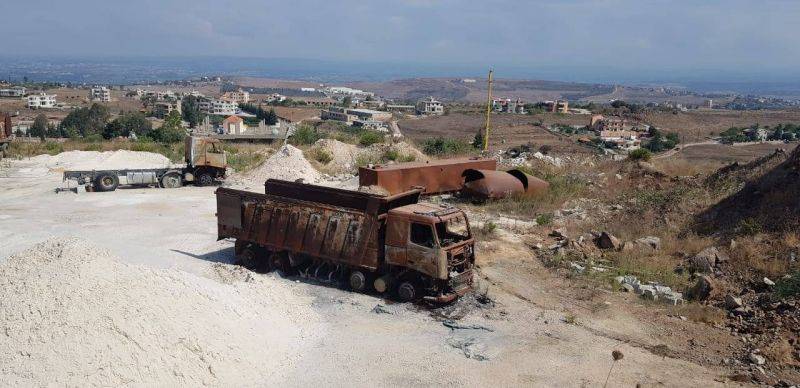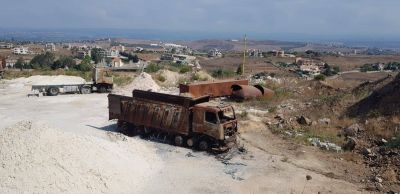
A charred truck and scrap metal abandoned at the scene of the Tleil tragedy one year after the blast. (Credit: Michel Hallak)
On the night of Aug. 14 to 15, 2021, in the midst of a fuel shortage in Lebanon, the town of Tleil in Akkar was awakened by a deadly explosion.
The army had discovered, a few hours earlier, two tanks of fuel illegally stored in a field in the village.
The officer on the spot searched the first one and decided to let the inhabitants help themselves for free from the second one, without suspecting the tragedy that was about to ensue. Shortly before 1:30 a.m., a huge explosion occurred, killing 31 people, including a dozen soldiers, and injuring 75 others, some seriously.
The tragedy shook the country. One year later, what do we know about this tragedy, which quickly left the news cycle's spotlight as the country spiralled further into economic collapse?
The first elements of the investigation into the events of that night showed that the fuel was stored by Ali Faraj, a known trafficker in the region who was imprisoned at the time of the events, on land belonging to one of his partners, Georges Ibrahim. At the end of July 2022, the courts issued an indictment against the two men, as well as against Georges Ibrahim's son, Richard, and another family member, Gergi, accused of deliberately setting fire to the premises.
"Richard gave a lighter to Gergi and asked him to 'burn the people' who were in front of the tank. He said this in front of several witnesses," Mohammad Mrad, a lawyer representing some 20 families of victims, told L'Orient-Le Jour. According to him, several hundred people had on the night in question rushed to the scene to obtain fuel. An altercation had then pitted the residents against Richard Ibrahim, who subsequently decided to burn the land in anger.
"Judge Ali Araji requested the death penalty for Richard and Gergi Ibrahim, because they premeditated the fire in order to cause harm to the residents. The sentence requested for George Ibrahim and Ali Faraj is less severe. They could face up to 15 years in prison for hiding fuel," explains Mrad.
Attempts to bribe the families
One year after the tragedy, Taha Koja, who lost his brother Walid, a 39-year-old soldier, is calling on the authorities to provide justice for the relatives of the victims and those injured in the blast. His brother was the father of three boys, aged 9, 7 and 2, and his brother's wife was pregnant at the time of the disaster — she gave birth to a daughter a few months ago.
"My sister-in-law has not yet been able to collect a cent in compensation. We have received checks from the army totaling LL60 million (about $1,900 at the current parallel market rate), but we have not been able to withdraw anything because of banking restrictions. The banks only give us LL2 million a month ($63). This is absurd. It is not enough to raise children," says Koja.
He also reveals that relatives of the accused are trying to bribe the families of the victims to withdraw their complaint. "They are paying LL120 million (about $3,800 on the parallel market) to those who lost a loved one and LL8 million (about $250) to those who were injured. They offered me money, but I refused. I would never be able to look my nephews in the eye again if I took bribes," sighs Koja.
The information was affirmed by MP Assaad Dergham (FPM/Akkar), who said that several clerics in Akkar are trying to conduct a "reconciliation" between the families involved. "Several clerics from the region have gone to Prime Minister Najib Mikati or the Commander in Chief of the Army Joseph Aoun to find an amicable solution and push the families to withdraw their complaint in return for financial compensation," he told L'Orient-Le Jour. Asked about the merits of an initiative that bypasses justice in one of the most significant tragedies of recent years, Dergham claims not to "interfere in the reconciliation led by religious dignitaries" and calls on "everyone to assume their responsibilities."
Wounded continue to suffer
Left to their fate since Aug. 15, 2021, Koja's family is experiencing "a difficult psychological situation. "We had to wait four days before being able to identify Walid's body because it was so unrecognizable. My second brother was injured in the hand and had several broken ribs after being propelled into the air by the explosion."
"By allowing people to help themselves directly from the tank, the army has allowed a time bomb to go off. The officer in charge that day must be held responsible. The authorities have handled this case very badly," Koja says. He also reports that the army commander agreed to enlist relatives of the victims of the explosion as compensation for their loss.
"No criminal responsibility has been held against the soldiers who were present in the course of their duties that night," says Mrad. "The soldiers were few in number on the ground and were taken by surprise by a massive influx of inhabitants who had come to collect petrol. The situation then quickly degenerated," he continues.
Koja calls on the authorities "to take care of the injured of Tleil, eight of whom continue to suffer serious after-effects.
"One of them has had a leg amputated, another has lost the use of one of his arms, a third has to wear a special suit and cannot survive without air conditioning while electricity rationing is becoming increasingly severe," sighs Koja.
A law signed by President Michel Aoun on April 12, 2022, allows the families of the victims to obtain compensation and monthly salaries, and allows those injured and disabled by the Tleil explosion to benefit from free medical care. While waiting for this law to come into force and for the trial to progress, the relatives of the victims and the injured continue to suffer in silence, both financially and physically.
This article was originally published in French in L'Orient-Le Jour.
